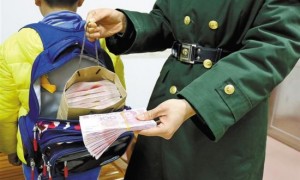China faces less pressure from capital outflows, according to data released by its currency regulator on Thursday, and economists said the situation may continue to improve in the second half of this year.
China's banks sold a net $93.8 billion of foreign exchange to clients in the first six months of this year, down 46 percent year-on-year, according to data released by the State Administration of Foreign Exchange.
The foreign exchange savings by individuals dropped by $1.7 billion in the first half of the year, compared with a rise of $12.9 billion in the same period a year earlier, Wang Chunying, the administration's spokeswoman, said at a news conference.
The falling net foreign exchange sales and savings, together with other statistics released by the regulator, show that "the cross-border capital flow situation China faces is improving in the first half of this year", Wang said.
China has faced heavy capital outflow pressure in recent years, with its foreign exchange reserves falling to about $3 trillion at the end of 2016 from nearly $4 trillion in 2014. As the country's economic fundamentals improve and its management of cross-border capital flow has strengthened in recent months, the situation has stabilized, with foreign exchange reserves rising for five consecutive months by June.
China's GDP growth reached a faster-than-expected 6.9 percent year-on-year in the first half. Meanwhile, authorities have tightened checks of dubious overseas investment projects in some sectors, such as real estate, hotel and sports, which has helped reduce abnormal outflows of capital.
"In terms of supply-demand balance in the foreign exchange market, we are facing the best situation in three years," Wang said.
Analysts said although China suffers from a foreign exchange sales deficit, it is not worrisome. "The SAFE (ad¬ministration) data show the situation is improving, and so long as it is controllable, we should not worry about the deficit," said Dong Yuping, an economist at the Chinese Academy of Social Sciences.
based on the current development, cross-border capital flows in terms of foreign exchange sales by banks may reach equilibrium in the fourth quarter of this year, with capital outflows largely matching inflows, said Chen Xingdong, deputy managing director and chief economist of BNP Paribas Peregrine Securities in China. "There could still be fluctuations in the third quarter, but balance is expected to emerge in the fourth quarter."
Despite the tightening of dubious overseas investments in some sectors, Wang of the administration said China's stance on supporting normal cross-border business deals has not changed.
"We support capable enterprises conducting genuine and normal foreign investment activities," Wang said. "On the other hand, we will effectively guard against outbound investment risks."







